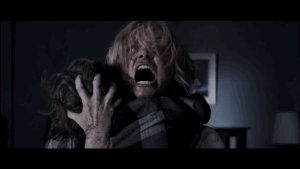The Good, The Bad and the Monstrous: Depictions of Motherhood in The Babadook
Being a mother is hard. Being a mother in a horror movie is even harder. Writer-director Jennifer Kent's 2014 Aussie horror The Babadook is as much a film about the challenges of motherhood as it is about the supernatural, depicting a single mother struggling to protect herself and her son from a monstrous force known throughout the film as Mister Babadook. The image that best represents this comes from the film's emotional climax, wherein Amelia (Essie Davis), the single mother, challenges the antagonistic force of Mister Babadook. Protectively clutching her son, she unleashes a primal scream that makes the monstrous figure retreat. Exploring how Amelia develops as a mother throughout the film to reach this point demonstrates how The Babadook eschews conventional depictions of motherhood by emphasising a mother's flaws and darker impulses while keeping her portrayal sympathetic.
Early scenes of The Babadook establish the relationship between Amelia and her son, Samuel (Noah Wiseman), as more disciplinary than loving. She scolds him for building weapons while preparing him for school, and offers no praise beyond a tired smile when he successfully performs a magic trick for her. While she allows him to affectionately stroke her cheek, she pushes Samuel away when he moves in for a loving hug. Amelia's intimacy issues are revealed to stem from the death of her husband (Benjamin Winspear), who was killed driving Amelia to the hospital to give birth to Samuel. Her first appearance in the film is Amelia refusing to celebrate Samuel's birthday on that day, as it marks the anniversary of her husband's death.
Samuel is also presented as a particularly troubled child – setting up traps around the house to fight the "monster" that he fears will take his mother away from him. These fears are likely influenced by Amelia's inability to acknowledge and move on from her husband's death. Samuel also joins Amelia in bed almost every night, wrapping his arms around her neck as he sleeps to symbolically smother her, leaving her sleep deprived and short-tempered. Through these early moments, Kent challenges the glamorised view of motherhood to instead tap into the darkest areas of a parent's mind, wherein "you find yourself wondering whether you even like, let alone love, that child in the first place".1 While this relationship between mother and son is tense, Amelia still attempts to provide a nurturing environment and be a good mother. It is only when she is possessed by Mister Babadook, perhaps a representation of her own repressed grief and resentment, that she becomes a more threatening figure.
When examining the role of mothers in horror cinema, Sarah Arnold's book Maternal Horror Film: Melodrama and Motherhood separates most depictions into one of two categories – the "Good" or "Bad" mother.2 Arnold notes that the Bad Mother is "at times … the monster or the villain … in other instances her prohibitive and overpowering nature produces violent tendencies in her children."3 Amelia meets both of these requirements, both before and after being possessed by Mister Babadook. Under the influence of Mister Babadook all of Amelia's repressed issues towards Samuel are brought to the surface, especially when she admits to him that, "You don't know how many times I'd wished it was you not him that died," and threatening, "Sometimes I just want to smash your head against a brick wall until your fucking brains pop out." Briony Kidd's review of the film explores how in these moments Kent twists societal expectations of motherhood for the purpose of horror, as "Mothers are socially conditioned to restrain hostile feelings towards their children and, in turn, film audiences are not used to seeing expressions of these feelings."4 Ultimately, Amelia is unable to murder her son as he displays his unconditional love towards his mother. In one key scene Samuel reaches out to affectionately stroke Amelia's cheek even as she strangles him, mirroring his action from the beginning of the film. This loving gesture forces Amelia to overcome Mister Babadook and her own psychological issues, and the monster is purged through a stream of black liquid vomit. Having now rejected her role as the Bad Mother, Amelia assumes the protective role of the Good Mother she plays in the film's climax.
Once separated from Mister Babadook, Amelia is able to face him directly and, in turn, confront her own flaws as a mother. Amelia warns the creature that "If you touch my son again I'll fucking kill you" as Samuel hides behind her. When Mister Babadook makes a final attempt to grab Samuel, Amelia wraps herself around him and unleashes the animalistic and primal scream presented in the attached GIF. Here Amelia assumes a role of authority and protection towards her son, meeting the requirements of a cinematic Good Mother as defined by Arnold: "to act as the primary caretaker of the child and, in the horror, to ensure their welfare at all times."5
Rather than presenting Amelia as a now flawless and idealised mother figure, Kent ensures that the final scenes of The Babadook remind the audience and the characters of Amelia's flaws. Delving into the basement to face Mister Babadook has become a part of Amelia's daily ritual in the film's epilogue. She struggles to keep it under control. But, these darker moments do not prevent the film from ending on an optimistic note. Amelia hugs her son and wishes him a happy birthday. This emphasises Kent's position – that it is possible for a mother to have elements of good and bad while still caring for their child.

